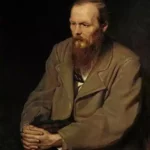 | |
A Faint Heart | |
| Author | Fyodor Dostoevsky |
|---|---|
| Published |
1846
|
| Language | English |
| Original Language | Russian |
| Nationality | Russian |
| Genre | Psychological Fiction, Russian Literature |
1846 Short Story
A Faint Heart
A Faint Heart is an English Psychological Fiction, Russian Literature short story by Russian writer Fyodor Dostoevsky. It was first published in 1846.
A Faint Heart
by Fyodor Dostoevsky
UNDER the same roof in the same flat on the same fourth storey lived two young men, colleagues in the service, Arkady Ivanovitch Nefedevitch and Vasya Shumkov. . . . The author of course, feels the necessity of explaining to the reader why one is given his full title, while the other’s name is abbreviated, if only that such a mode of expression may not be regarded as unseemly and rather familiar. But, to do so, it would first be necessary to explain and describe the rank and years and calling and duty in the service, and even, indeed, the characters of the persons concerned; and since there are so many writers who begin in that way the author of the proposed story, solely in order to be unlike them (that is, some people will perhaps say, entirely on account of his boundless vanity), decides to begin straightaway with action. Having completed this introduction, he begins.
Towards six o’clock on New Year’s Eve Shumkov returned home. Arkady Ivanovitch, who was lying on the bed, woke up and looked at his friend with half-closed eyes. He saw that Vasya had on his very best trousers and a very clean shirt front. That, of course, struck him. “Where had Vasya to go like that? And he had not dined at home either!” Meanwhile, Shumkov had lighted a candle, and Arkady Ivanovitch guessed immediately that his friend was intending to wake him accidentally. Vasya did, in fact, clear his throat twice, walked twice up and down the room, and at last, quite accidentally, let the pipe, which he had begun filling in the corner by the stove, slip out of his hands. Arkady Ivanovitch laughed to himself.
“Vasya, give over pretending!” he said.
“Arkasha, you are not asleep?”
“I really cannot say for certain; it seems to me I am not.”
“Oh, Arkasha! How are you, dear boy? Well, brother! Well, brother! . . . You don’t know what I have to tell you! ”
“I certainly don’t know; come here.”
As though expecting this, Vasya went up to him at once, not at all anticipating, however, treachery from Arkady Ivanovitch. The other seized him very adroitly by the arms, turned him over, held him down, and began, as it is called, “strangling” his victim, and apparently this proceeding afforded the light-hearted Arkady Ivanovitch great satisfaction.
“Caught!” he cried. “Caught!”
“Arkasha, Arkasha, what are you about? Let me go. For goodness sake, let me go, I shall crumple my dress coat!”
“As though that mattered! What do you want with a dress coat? Why were you so confiding as to put yourself in my hands? Tell me, where have you been? Where have you dined?”
“Arkasha, for goodness sake, let me go!”
“Where have you dined?”
“Why, it’s about that I want to tell you.”
“Tell away, then.”
“But first let me go.”
“Not a bit of it, I won’t let you go till you tell me!”
“Arkasha! Arkasha! But do you understand, I can’t it is utterly impossible!” cried Vasya, helplessly wriggling out of his friend’s powerful clutches, “you know there are subjects!”
“How subjects?” . . .
“Why, subjects that you can’t talk about in such a position without losing your dignity; it’s utterly impossible; it would make it ridiculous, and this is not a ridiculous matter, it is important.”
“Here, he’s going in for being important! That’s a new idea! You tell me so as to make me laugh, that’s how you must tell me; I don’t want anything important; or else you are no true friend of mine. Do you call yourself a friend? Eh?”
“Arkasha, I really can’t!”
“Well, I don’t want to hear. . . .”
“Well, Arkasha! ” began Vasya, lying across the bed and doing his utmost to put all the dignity possible into his words.” Arkasha! If you like, I will tell you; only . . .”
“Well, what? . . .”
“Well, I am engaged to be married!”
Without uttering another word Arkady Ivanovitch took Vasya up in his arms like a baby, though the latter was by no means short, but rather long and thin, and began dexterously carrying him up and down the room, pretending that he was hushing him to sleep.
“I’ll put you in your swaddling clothes, Master Bridegroom,” he kept saying. But seeing that Vasya lay in his arms, not stirring or uttering a word, he thought better of it at once, and reflecting that the joke had gone too far, set him down in the middle of the room and kissed him on the cheek in the most genuine and friendly way.
“Vasya, you are not angry?”
“Arkasha, listen. …”
“Come, it’s New Year’s Eve.”
“Oh, I’m all right; but why are you such a madman, such a scatterbrain? How many times I have told you: Arkasha, it’s really not funny, not funny at all! ”
“Oh, well, you are not angry?”
“Oh, I’m all right; am I ever angry with any one! But you have wounded me, do you understand?”
“But how have I wounded you? In what way?”
“I come to you as to a friend, with a full heart, to pour out my soul to you, to tell you of my happiness . . .”
“What happiness? Why don’t you speak? . . .”
“Oh, well, I am going to get married!” Vasya answered with vexation, for he really was a little exasperated.
“You! You are going to get married! So you really mean it?” Arkasha cried at the top of his voice.” No, no … but what’s this? He talks like this and his tears are flowing. . . . Vasya, my little Vasya, don’t, my little son! Is it true, really?”
And Arkady Ivanovitch flew to hug him again.
“Well, do you see, how it is now?” said Vasya. “You are kind, of course, you are a friend, I know that. I come to you with such joy, such rapture, and all of a sudden I have to disclose all the joy of my heart, all my rapture struggling across the bed, in an undignified way. . . . You understand, Arkasha,” Vasya went on, half laughing. “You see, it made it seem comic: and in a sense I did not belong to myself at that minute. I could not let this be slighted. . . What’s more, if you had asked me her name, I swear, I would sooner you killed me than have answered you.”
“But, Vasya, why did you not speak! You should have told me all about it sooner and I would not have played the fool!” cried Arkady Ivanovitch in genuine despair.
“Come, that’s enough, that’s enough! Of course, that’s how it is. . . . You know what it all comes from from my having a good heart. What vexes me is, that I could not tell you as I wanted to, making you glad and happy, telling you nicely and initiating you into my secret properly. . . . Really, Arkasha, I love you so much that I believe if it were not for you I shouldn’t be getting married, and, in fact, I shouldn’t be living in this world at all!”
Arkady Ivanovitch, who was excessively sentimental, cried and laughed at once as he listened to Vasya. Vasya did the same. Both flew to embrace one another again and forgot the past.
“How is it how is it? Tell me all about it, Vasya! I am astonished, excuse me, brother, but I am utterly astonished; it’s a perfect thunderbolt, by Jove! Nonsense, nonsense, brother, you have made it up, you’ve really made it up, you are telling fibs!” cried Arkady Ivanovitch, and he actually looked into Vasya’s face with genuine uncertainty, but seeing in it the radiant confirmation of a positive intention of being married as soon as possible, threw himself on the bed and began rolling from side to side in ecstasy till the walls shook.
“Vasya, sit here,” he said at last, sitting down on the bed.
“I really don’t know, brother, where to begin!”
They looked at one another in joyful excitement.
“Who is she, Vasya?”
“The Artemyevs! . . .” Vasya pronounced, in a voice weak with emotion.
“No?”
“Well, I did buzz into your ears about them at first, and then I shut up, and you noticed nothing. Ah, Arkasha, if you knew how hard it was to keep it from you; but I was afraid, afraid to speak! I thought it would all go wrong, and you know I was in love, Arkasha! My God! My God! You see this was the trouble,” he began, pausing continually from agitation, “she had a suitor a year ago, but he was suddenly ordered somewhere; I knew him he was a fellow, bless him! Well, he did not write at all, he simply vanished. They waited and waited, wondering what it meant. . . . Four months ago he suddenly came back married, and has never set foot within their doors! It was coarse, shabby! And they had no one to stand up for them. She cried and cried, poor girl, and I fell in love with her . . . indeed, I had been in love with her long before, all the time! I began comforting her, and was always going there. . . . Well, and I really don’t know how it has all come about, only she came to love me; a week ago I could not restrain myself, I cried, I sobbed, and told her everything well, that I love her everything, in fact !… ‘! am ready to love you, too, Vassily Petrovitch, only I am a poor girl, don’t make a mock of me; I don’t dare to love any one.’ Well, brother, you understand! You understand? . . . On that we got engaged on the spot . I kept thinking and thinking and thinking and thinking, I said to her, ‘How are we to tell your mother?’ She said, ‘It will be hard, wait a little; she’s afraid, and now maybe she would not let you have me; she keeps crying, too.’ Without telling her I blurted it out to her mother today. Lizanka fell on her knees before her, I did the same . . . well, she gave us her blessing. Arkasha, Arkasha! My dear fellow! We will live together. No, I won’t part from you for anything.”
“Vasya, look at you as I may, I can’t believe it. I don’t believe it, I swear. I keep feeling as though. . . . Listen, how can you be engaged to be married? . . . How is it I didn’t know, eh? Do you know, Vasya, I will confess it to you now. I was thinking of getting married myself; but now since you are going to be married, it is just as good! Be happy, be happy! . . .”
“Brother, I feel so lighthearted now, there is such sweetness in my soul …” said Vasya, getting up and pacing about the room excitedly. “Don’t you feel the same? We shall be poor, of course, but we shall be happy; and you know it is not a wild fancy; our happiness is not a fairy tale; we shall be happy in reality! . . .”
“Vasya, Vasya, listen!”
“What?” said Vasya, standing before Arkady Ivanovitch.
“The idea occurs to me; I am really afraid to say it to you. . . . Forgive me, and settle my doubts. What are you going to live on? You know I am delighted that you are going to be married, of course, I am delighted, and I don’t know what to do with myself, but what are you going to live on? Eh?”
“Oh, good Heavens! What a fellow you are, Arkasha!” said Vasya, looking at Nefedevitch in profound astonishment. “What do you mean? Even her old mother, even she did not think of that for two minutes when I put it all clearly before her. You had better ask what they are living on! They have five hundred roubles a year between the three of them: the pension, which is all they have, since the father died. She and her old mother and her little brother, whose schooling is paid for out of that income too–that is how they live! It’s you and I are the capitalists! Some good years it works out to as much as seven hundred for me.”
“I say, Vasya, excuse me; I really . . . you know I … I am only thinking how to prevent things going wrong. How do you mean, seven hundred? It’s only three hundred . . .”
“Three hundred! . . . And Yulian Mastakovitch? Have you forgotten him?”
“Yulian Mastakovitch? But you know that’s uncertain, brother; that’s not the same thing as three hundred roubles of secure salary, where every rouble is a friend you can trust. Yulian Mastakovitch, of course, he’s a great man, in fact, I respect him, I understand him, though he is so far above us; and, by Jove, I love him, because he likes you and gives you something for your work, though he might not pay you, but simply order a clerk to work for him but you will agree, Vasya. . . . Let me tell you, too, I am not talking nonsense. I admit in all Petersburg you won’t find a handwriting like your handwriting, I am ready to allow that to you,” Nefedevitch concluded, not without enthusiasm. “But, God forbid! you may displease him all at once, you may not satisfy him, your work with him may stop, he may take another clerk all sorts of things may happen, in fact! You know, Yulian Mastakovitch may be here to-day and gone to-morrow . . .”
“Well, Arkasha, the ceiling might fall on our heads this minute.”
“Oh, of course, of course, I mean nothing.”
“But listen, hear what I have got to say you know, I don’t see how he can part with me. . . . No, hear what I have to say! Hear what I have to say! You see, I perform all my duties punctually; you know how kind he is, you know, Arkasha, he gave me fifty roubles in silver today!”
“Did he really, Vasya? A bonus for you?”
“Bonus, indeed, it was out of his own pocket. He said: ‘Why, you have had no money for five months, brother, take some if you want it; thank you, I am satisfied with you.’ . . . Yes, really! ‘Yes, you don’t work for me for nothing,’ said he. He did, indeed, that’s what he said. It brought tears into my eyes, Arkasha. Good Heavens, yes!”
“I say, Vasya, have you finished copying those papers? . . .”
“No. … I haven’t finished them yet.”
“Vas . . . ya ! My angel ! What have you been doing?”
“Listen, Arkasha, it doesn’t matter, they are not wanted for another two days, I have time enough. …”
“How is it you have not done them?”
”That’s all right, that’s all right. You look so horror-stricken that you turn me inside out and make my heart ache! You are always going on at me like this! He’s for ever crying out: Oh, oh, oh ! ! ! Only consider, what does it matter? Why, I shall finish it, of course I shall finish it. . . .”
“What if you don’t finish it?” cried Arkady, jumping up, “and he has made you a present to-day! And you going to be married. . . . Tut, tut, tut! . . .”
“It’s all right, it’s all right,” cried Shumkov, “I shall sit down directly, I shall sit down this minute.”
“How did you come to leave it, Vasya?”
“Oh, Arkasha! How could I sit down to work! Have I been in a fit state? Why, even at the office I could scarcely sit still, I could scarcely bear the beating of my heart. . . . Oh! oh ! Now I shall work all night, and I shall work all to-morrow night, and the night after, too and I shall finish it.”
“Is there a great deal left?”
“Don’t hinder me, for goodness’ sake, don’t hinder me; hold your tongue.”
Arkady Ivanovitch went on tip-toe to the bed and sat down, then suddenly wanted to get up, but was obliged to sit down again, remembering that he might interrupt him, though he could not sit still for excitement: it was evident that the news had thoroughly upset him, and the first thrill of delight had not yet passed off. He glanced at Shumkov; the latter glanced at him, smiled, and shook his finger at him, then, frowning severely (as though all his energy and the success of his work depended upon it), fixed his eyes on the papers.
It seemed that he, too, could not yet master his emotion; he kept changing his pen, fidgeting in his chair, re-arranging things, and setting to work again, but his hand trembled and refused to move.
“Arkasha, I’ve talked to them about you,” he cried suddenly, as though he had just remembered it.
“Yes,” cried Arkasha, “I was just wanting to ask you that. Well?”
“Well, I’ll tell you everything afterwards. Of course, it is my own fault, but it quite went out of my head that I didn’t mean to say anything till I had written four pages, but I thought of you and of them. I really can’t write, brother, I keep thinking about you. …”
Vasya smiled.
A silence followed.
“Phew! What a horrid pen,” cried Shumkov, flinging it on the table in vexation. He took another.
“Vasya! listen! one word …”
“Well, make haste, and for the last time.”
“Have you a great deal left to do?”
“Ah, brother!” Vasya frowned, as though there could be nothing more terrible and murderous in the whole world than such a question. “A lot, a fearful lot.”
“Do you know, I have an idea.”
“What?”
“Oh, never mind, never mind; go on writing.”
“Why, what? What!”
“It’s past six, Vasya.”
Here Nefedevitch smiled and winked slyly at Vasya, though with a certain timidity, not knowing how Vasya would take it.
“Well, what is it?” said Vasya, throwing down his pen, looking him straight in the face and actually turning pale with excitement.
“Do you know what?”
“For goodness sake, what is it?”
“I tell you what, you are excited, you won’t get much done. . . . Stop, stop, stop! I have it, I have it listen,” said Nefedevitch, jumping up from the bed in delight, preventing Vasya from speaking and doing his utmost to ward off all objections; ” first of all you must get calm, you must pull yourself together, mustn’t you?”
“Arkasha, Arkasha!” cried Vasya, jumping up from his chair, “I will work all night, I will, really.”
“Of course, of course, you won’t go to bed till morning.”
“I won’t go to bed, I won’t go to bed at all.”
“No, that won’t do, that won’t do: you must sleep, go to bed at five. I will call you at eight. Tomorrow is a holiday; you can sit and scribble away all day long. . . . Then the night and–but have you a great deal left to do?”
“Yes, look, look!”
Vasya, quivering with excitement and suspense, showed the manuscript: “Look!”
“I say, brother, that’s not much.”
“My dear fellow, there’s some more of it,” said Vasya, looking very timidly at Nefedevitch, as though the decision whether he was to go or not depended upon the latter.
“How much?”
“Two signatures.”
“Well, what’s that? Come, I tell you what. We shall have time to finish it, by Jove, we shall!”
“Arkasha!”
“Vasya, listen! To-night, on New Year’s Eve, every one is at home with his family. You and I are the only ones without a home or relations. . . . Oh, Vasya!”
Nefedevitch clutched Vasya and hugged him in his leonine arms.
“Arkasha, it’s settled.”
“Vasya, boy, I only wanted to say this. You see, Vasya listen, bandy-legs, listen! . . .”
Arkady stopped, with his mouth open, because he could not speak for delight. Vasya held him by the shoulders, gazed into his face and moved his lips, as though he wanted to speak for him.
“Well,” he brought out at last. “Introduce me to them to-day.”
“Arkady, let us go to tea there. I tell you what, I tell you what. We won’t even stay to see in the New Year, we’ll come away earlier,” cried Vasya, with genuine inspiration.
“That is, we’ll go for two hours, neither more nor less . . . .”
“And then separation till I have finished. …”
“Vasya, boy!”
“Arkady!”
Three minutes later Arkady was dressed In his best. Vasya did nothing but brush himself, because he had been in such haste to work that he had not changed his trousers.
They hurried out into the street, each more pleased than the other. Their way lay from the Petersburg Side to Kolomna. Arkady Ivanovitch stepped out boldly and vigorously, so that from his walk alone one could see how glad he was at the good fortune of his friend, who was more and more radiant with happiness. Vasya trotted along with shorter steps, though his deportment was none the less dignified. Arkady Ivanovitch, in fact, had never seen him before to such advantage. At that moment he actually felt more respect for him, and Vasya’s physical defect, of which the reader is not yet aware (Vasya was slightly deformed), which always called forth a feeling of loving sympathy in Arkady Ivanovitch’s kind heart, contributed to the deep tenderness the latter felt for him at this moment, a tenderness of which Vasya was in every way worthy. Arkady Ivanovitch felt ready to weep with happiness, but he restrained himself.
“Where are you going, where are you going, Vasya? It is nearer this way,” he cried, seeing that Vasya was making in the direction of Voznesenky.
“Hold your tongue, Arkasha.”
“It really is nearer, Vasya.”
“Do you know what, Arkasha?” Vasya began mysteriously, in a voice quivering with joy, “I tell you what, I want to take Lizanka a little present.”
“What sort of present?”
“At the corner here, brother, is Madame Leroux’s, a wonderful shop.”
“Well.”
“A cap, my dear, a cap; I saw such a charming little cap to-day. I inquired, I was told it was the fag on Manon Lescaut–a delightful thing. Cherry-coloured ribbons, and if it is not dear . . . Arkasha, even if it is dear. . . .”
“I think you are superior to any of the poets. Vasya. Come along.”
They ran along, and two minutes later went into the shop. They were met by a black-eyed Frenchwoman with curls, who, from the first glance at her customers, became as joyous and happy as they, even happier, if one may say so. Vasya was ready to kiss Madame Leroux in his delight. . . .
“Arkasha,” he said in an undertone, casting a casual glance at all the grand and beautiful things on little wooden stands on the huge table, “lovely things! What’s that? What’s this? This one, for instance, this little sweet, do you see?” Vasya whispered, pointing to a charming cap further away, which was not the one he meant to buy, because he had already from afar descried and fixed his eyes upon the real, famous one, standing at the other end. He looked at it in such a way that one might have supposed some one was going to steal it, or as though the cap itself might take wings and fly into the air just to prevent Vasya from obtaining it.
“Look,” said Arkady Ivanovitch, pointing to one, “I think that’s better.”
“Well, Arkasha, that does you credit; I begin to respect you for your taste,” said Vasya, resorting to cunning with Arkasha in the tenderness of his heart, “your cap is charming, but come this way.”
“Where is there a better one, brother?”
“Look; this way.”
“That,” said Arkady, doubtfully.
But when Vasya, incapable of restraining himself any longer, took it from the stand from which it seemed to fly spontaneously, as though delighted at falling at last into the hands of so good a customer, and they heard the rustle of its ribbons, ruches and lace, an unexpected cry of delight broke from the powerful chest of Arkady Ivanovitch. Even Madame Leroux, while maintaining her incontestable dignity and pre-eminence in matters of taste, and remaining mute from condescension, rewarded Vasya with a smile of complete approbation, everything in her glance, gesture and smile saying at once: “Yes, you have chosen rightly, and are worthy of the happiness which awaits you.”
“It has been dangling its charms in coy seclusion,” cried Vasya, transferring his tender feelings to the charming cap. “You have been hiding on purpose, you sly little pet!” And he kissed it, that is the air surrounding it, for he was afraid to touch his treasure.
“Retiring as true worth and virtue,” Arkady added enthusiastically, quoting humorously from a comic paper he had read that morning. “Well, Vasya?”
“Hurrah, Arkasha! You are witty to-day. I predict you will make a sensation, as women say. Madame Leroux, Madame Leroux!”
“What is your pleasure?”
“Dear Madame Leroux.”
Madame Leroux looked at Arkady Ivanovitch and smiled condescendingly. “You wouldn’t believe how I adore you at this moment. . . . Allow me to give you a kiss. …” And Vasya kissed the shopkeeper.
She certainly at that moment needed all her dignity to maintain her position with such a madcap. But I contend that the innate, spontaneous courtesy and grace with which Madame Leroux received Vasya’s enthusiasm, was equally befitting. She forgave him, and how tactfully, how graciously, she knew how to behave in the circumstances. How could she have been angry with Vasya?
“Madame Leroux, how much?”
“Five roubles in silver,” she answered, straightening herself with a new smile.
“And this one, Madame Leroux?” said Arkady Ivanovitch, pointing to his choice.
“That one is eight roubles.”
“There, you see there, you see! Come, Madame Leroux, tell me which is nicer, more graceful, more charming, which of them suits you best?”
“The second is richer, but your choice c’est plus coquet.”
“Then we will take it.”
Madame Leroux took a sheet of very delicate paper, pinned it up, and the paper with the cap wrapped in it seemed even lighter than the paper alone. Vasya took it carefully, almost holding his breath, bowed to Madame Leroux, said something else very polite to her and left the shop.
“I am a lady’s man, I was born to be a lady’s man,” said Vasya, laughing a little noiseless, nervous laugh and dodging the passers-by, whom he suspected of designs for crushing his precious cap.
“Listen, Arkady, brother,” he began a minute later, and there was a note of triumph, of infinite affection in his voice. “Arkady, I am so happy, I am so happy!”
“Vasya! how glad I am, dear boy! ”
“No, Arkasha, no. I know that there is no limit to your affection for me; but you cannot be feeling one-hundredth part of what I am feeling at this moment. My heart is so full, so full! Arkasha, I am not worthy of such happiness. I feel that, I am conscious of it. Why has it come to me?” he said, his voice full of stifled sobs. “What have I done to deserve it? Tell me. Look what lots of people, what lots of tears, what sorrow, what work-a-day life without a holiday, while I, I am loved by a girl like that, I…. But you will see her yourself immediately, you will appreciate her noble heart. I was born in a humble station, now I have a grade in the service and an independent income–my salary. I was born with a physical defect, I am a little deformed. See, she loves me as I am. Yulian Mastakovitch was so kind, so attentive, so gracious to-day; he does not often talk to me; he came up to me: ‘Well, how goes it, Vasya’ (yes, really, he called me Vasya), ‘are you going to have a good time for the holiday, eh?’ he laughed.
“‘Well, the fact is, Your Excellency, I have work to do,’ but then I plucked up courage and said: ‘and maybe I shall have a good time, too, Your Excellency.’ I really said it. He gave me the money, on the spot, then he said a couple of words more to me. Tears came into my eyes, brother, I actually cried, and he, too, seemed touched, he patted me on the shoulder, and said: ‘Feel always, Vasya, as you feel this now.”
Vasya paused for an instant. Arkady Ivanovitch turned away, and he, too, wiped away a tear with his fist.
“And, and . . .” Vasya went on, “I have never spoken to you of this, Arkady. . . Arkady, you make me so happy with your affection, without you I could not live, no, no, don’t say anything, Arkady, let me squeeze your hand, let me . . tha . . . ank . . . you …” Again Vasya could not finish.
Arkady Ivanovitch longed to throw himself on Vasya’s neck, but as they were crossing the road and heard almost in their ears a shrill: “Hi! there!” they ran frightened and excited to the pavement.
Arkady Ivanovitch was positively relieved. He set down Vasya’s outburst of gratitude to the exceptional circumstances of the moment. He was vexed. He felt that he had done so little for Vasya hitherto. He felt actually ashamed of himself when Vasya began thanking him for so little. But they had all their lives before them, and Arkady Ivanovitch breathed more freely.
The Artemyevs had quite given up expecting them. The proof of it was that they had already sat down to tea! And the old, it seems, are sometimes more clear-sighted than the young, even when the young are so exceptional. Lizanka had very earnestly maintained, “He isn’t coming, he isn’t coming, Mamma; I feel in my heart he is not coming;” while her mother on the contrary declared “that she had a feeling that he would certainly come, that he would not stay away, that he would run round, that he could have no office work now, on New Year’s Eve. Even as Lizanka opened the door she did not in the least expect to see them, and greeted them breathlessly, with her heart throbbing like a captured bird’s, flushing and turning as red as a cherry, a fruit which she wonderfully resembled. Good Heavens, what a surprise it was! What a joyful “Oh!” broke from her lips. “Deceiver! My darling!” she cried, throwing her arms round Vasya’s neck. But imagine her amazement, her sudden confusion: just behind Vasya, as though trying to hide behind his back, stood Arkady Ivanovitch, a trifle out of countenance. It must be admitted that he was awkward in the company of women, very awkward indeed, in fact on one occasion something occurred . . . but of that later. You must put yourself in his place, however. There was nothing to laugh at; he was standing in the entry, in his goloshes and overcoat, and in a cap with flaps over the ears, which he would have hastened to pull off, but he had, all twisted round in a hideous way, a yellow knitted scarf, which, to make things worse, was knotted at the back. He had to disentangle all this, to take it off as quickly as possible, to show himself to more advantage, for there is no one who does not prefer to show himself to advantage. And then Vasya, vexatious insufferable Vasya, of course always the same dear kind Vasya, but now insufferable, ruthless Vasya. ” Here,” he shouted, “Lizanka, I have brought you my Arkady? What do you think of him? He is my best friend, embrace him, kiss him, Lizanka, give him a kiss in advance; afterwards you will know him better–you can take it back again.”
Well, what, I ask you, was Arkady Ivanovitch to do? And he had only untwisted half of the scarf so far. I really am sometimes ashamed of Vasya’s excess of enthusiasm; it is, of course, the sign of a good heart, but . . . it’s awkward, not nice!
At last both went in. … The mother was unutterably delighted to make Arkady Ivanovitch’s acquaintance, “she had heard so much about him, she had …” But she did not finish. A joyful “Oh!” ringing musically through the room interrupted her in the middle of a sentence. Good Heavens! Lizanka was standing before the cap which had suddenly been unfolded before her gaze; she clasped her hands with the utmost simplicity, smiling such a smile…. Oh, Heavens! Why had not Madame Leroux an even lovelier cap?
Oh, Heavens! but where could you find a lovelier cap? It was quite first-rate. Where could you get a better one? I mean it seriously. This ingratitude on the part of lovers moves me, in fact, to indignation and even wounds me a little. Why, look at it for yourself, reader, look, what could be more beautiful than this little love of a cap? Come, look at it. … But, no, no, my strictures are uncalled for; they had by now all agreed with me; it had been a momentary aberration; the blindness, the delirium of feeling; I am ready to forgive them. . . . But then you must look . . . You must excuse me, kind reader, I am still talking about the cap: made of tulle, light as a feather, a broad cherry-coloured ribbon covered with lace passing between the tulle and the ruche, and at the back two wide long ribbons they would fall down a little below the nape of the neck. . . . All that the cap needed was to be tilted a little to the back of the head; come, look at it; I ask you, after that . . . but I see you are not looking . . . you think it does not matter. You are looking in a different direction. . . . You are looking at two big tears, big as pearls, that rose in two jet black eyes, quivered for one instant on the eye lashes, and then dropped on the ethereal tulle of which Madame Leroux’s artistic masterpiece was composed. . . . And again I feel vexed, those two tears were scarcely a tribute to the cap. . . . No, to my mind, such a gift should be given in cool blood, as only then can its full worth be appreciated. I am, I confess, dear reader, entirely on the side of the cap.
They sat down Vasya with Lizanka and the old mother with Arkady Ivanovitch; they began to talk, and Arkady Ivano







